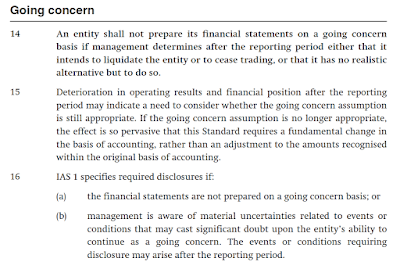COVID-19: Accountants And Auditors Responsibility On Financial Statements
The world is experiencing an unprecedented occurrence due to the Covid-19 and unusual situations have escalated on the financial and economic environment. Professionals are on look out to identify how and to what extent this will affect previous, current and future economic activities of businesses.
It is important to realize that this situation will affect the preparation and audit of financial statements, one of such instants is the adjustment and disclosure requirement for subsequent event (in this case going concern) that affect the financial statement. IAS 10-events after reporting period and ISA 560 Subsequent event, are standards that deal with such scenarios.
Going concern assumption (paragraph 3.9 The Framework): State that financial statement should be prepared on the assumption that the reporting entity is a going concern and will continue in operation for the foreseeable future.
ALSO READ: Benefits Of Timely And Accurate Financial Reporting
IAS 10, Event after reporting period: This International Accounting Standard state out the scope, definitions, recognition & measurement and disclosure requirement for events occurring after the reporting period but before the financial statement is issued. Accountant are required to follow these guidelines in the preparation of financial statement that comply with IFRSs.
ISA 560, Subsequent event: This International Standard on Auditing deal with the auditor’s responsibilities relating to subsequent events in an audit of financial statement. Auditors have the duty to perform an audit in compliance with relevant ISAs.
I have identified three (3) scenarios where the assessment of going concern might affect the basis of preparing financial statements due to covid-19. They are:
1. Where covid-19 crisis period falls within the reporting period of the reporting entity
2. Where covid-19 crisis period falls after the reporting period but before the financial statement is issued
3. Where the financial statement has been issued before covid-19 pandemic.
Scenario one and two are pretty straight forward. Accountant will consider the requirement of The Framework and IAS 10 requirements as regard going concern for scenario 1 and 2 respectively. Also, the auditor will follow the guidelines in ISA 570 (going concern) and ISA 560 in it audit procedures for scenario 1 and 2.
ALSO READ: Services Provided By Accounting Firms
However, scenario 3 is a bit complex and I will explain further the accounting implications of this scenario. ISA 560 paragraph 14 – 17, places additional responsibility on auditor for facts which become known to the auditor after the financial statements have been issued. See picture below.
It is important to realize that this situation will affect the preparation and audit of financial statements, one of such instants is the adjustment and disclosure requirement for subsequent event (in this case going concern) that affect the financial statement. IAS 10-events after reporting period and ISA 560 Subsequent event, are standards that deal with such scenarios.
Going concern assumption (paragraph 3.9 The Framework): State that financial statement should be prepared on the assumption that the reporting entity is a going concern and will continue in operation for the foreseeable future.
ALSO READ: Benefits Of Timely And Accurate Financial Reporting
IAS 10, Event after reporting period: This International Accounting Standard state out the scope, definitions, recognition & measurement and disclosure requirement for events occurring after the reporting period but before the financial statement is issued. Accountant are required to follow these guidelines in the preparation of financial statement that comply with IFRSs.
ISA 560, Subsequent event: This International Standard on Auditing deal with the auditor’s responsibilities relating to subsequent events in an audit of financial statement. Auditors have the duty to perform an audit in compliance with relevant ISAs.
I have identified three (3) scenarios where the assessment of going concern might affect the basis of preparing financial statements due to covid-19. They are:
1. Where covid-19 crisis period falls within the reporting period of the reporting entity
2. Where covid-19 crisis period falls after the reporting period but before the financial statement is issued
3. Where the financial statement has been issued before covid-19 pandemic.
Scenario one and two are pretty straight forward. Accountant will consider the requirement of The Framework and IAS 10 requirements as regard going concern for scenario 1 and 2 respectively. Also, the auditor will follow the guidelines in ISA 570 (going concern) and ISA 560 in it audit procedures for scenario 1 and 2.
ALSO READ: Services Provided By Accounting Firms
However, scenario 3 is a bit complex and I will explain further the accounting implications of this scenario. ISA 560 paragraph 14 – 17, places additional responsibility on auditor for facts which become known to the auditor after the financial statements have been issued. See picture below.
If after the financial statements have been issued, the auditor assesses the risk of COVID-19 on such client and he is of the opinion that going concern previously assessed will be materially misleading. The auditor has a duty to communicate such to the client and consider its effect on the audit report.
The duty of management relating to going concern after the reporting date is stated in paragraph 14 – 16 (IAS 10). See picture below.
The question now is, will management be willing to adjust for going concern after the financial statement has been issued? How will auditors respond to such situation and mitigate the risk of audit liability?
Conclusion on this scenario:
If adjustment or changes to the basis in preparing such financial statements are unrealistic, at minimum, an additional note clearly stating the going concern threat posed on such client, the effect and possibly the strategy, management intend to utilize to revive such company should be included in the financial statements.
The preceding scenarios indicate that accountants and auditors should be vigilant of these uncommon situations as a result of the pandemic, in the discharge of their duties. What are your thoughts on this? I’m open to opinions and contributions.
Nurudeen Oyedele
Email: Easytundey@gmail.com













